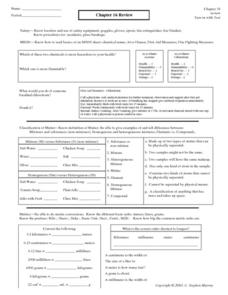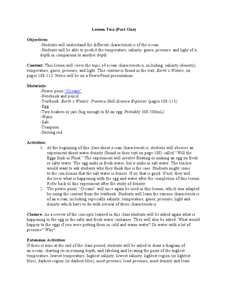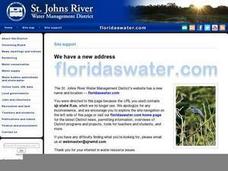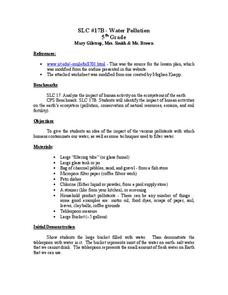Curated OER
Black Pearls
Students examine where pearls come from and where mollusks are found. They discover how pearls are formed in nature and how they are they made by humans. They use ordinary oyster shells to examine mother of pearl.
Curated OER
Salt is Good On Sunflower Seeds, But What About Cypress?
Students record their observations about growing a cypress plant and putting salt in the plant. In this cypress plant lesson plan, students observe and record what is happening as the cypress plant grows. This gives directions for...
Curated OER
Liquids of Different Densities
Learners compare the densities of different liquids. In this liquids lesson plan, students compare color, viscosity, weight, volume, and graph their findings.
Curated OER
The Excretory System
In this excretory system worksheet, students read a brief excerpt about water balance and the excretory system. Then they identify what compound birds, insects and reptiles living in dry habitats excrete. Students also describe how...
Curated OER
Beginning Critical Reading- Water
In this ESL worksheet, students read a five paragraph text about water. Students then answer 5 multiple choice questions about the passage.
Curated OER
Hudson River Salt Front Activity
In this Hudson River instructional activity, learners read a passage about the Hudson and salinity, they complete graph interpretation and questions and activities.
Curated OER
Wanted: Water!
Students determine what percentage of the Earth is water and how much water is needed by humans.
Curated OER
Fish In a Bottle
Students work together to build their own fish ecosystems. As a class, they share their prior knowledge about catfish and use a diagram to label its body parts. They record their observations of the ecosystem and determine what they...
Curated OER
Snapshot Day Definitions & Activities
In this watershed activity, students read through related definitions and complete 17 short answer questions about deposition and erosion in the Hudson River.
Curated OER
Chapter 16 Review- General Science
For this review of general science worksheet, students classify examples of matter as mixtures or substances, homogeneous or heterogeneous mixtures, or elements or compounds. Students also convert several examples using the standard...
Curated OER
Lesson tow
Students study the ocean and its characteristics. In this oceans lesson students complete a lab activity and are able to predict temperature of certain depths.
Curated OER
Lesson 6 - Our Important Wetlands and Uplands
Students examine the benefits wetlands provide to man and nature. They compare types of wetlands in northeast or east-central Florida. They discover ways that uplands affect wetlands and water bodies.
Curated OER
Nothing New? A Physical Change
Fifth graders discuss the differences between chemical and physical changes. In groups, they complete experiments and discover how a physical chnage can be reversed. To end the lesson, they review the steps of the water cycle and...
Curated OER
Fish Crossword
In this fish crossword puzzle worksheet, students use the 19 clues to identify the correct fish terms that will solve the crossword puzzle.
Curated OER
Water Is Cool!
Young scholars explore the importance of water. In this water lesson, students view a table to determine the amount of water found in the oceans, lakes, atmosphere, and streams. Young scholars discuss ways to be a good steward of water.
Curated OER
Salmon Life Cycle Crossword Puzzle
In this salmon life cycle ;crossword puzzle instructional activity, students use the 20 clues to identify the correct words that will solve the crossword puzzle.
Curated OER
Salinity Experiment
In this salinity experiment activity, students follow the procedures to set up an experiment about how salinity affects the weight of water.
Curated OER
Water Pressure - Disparity of Resources
Students examine the disparity of resources between developing and industrialized nations, and research the problem of water availability as world populations increase and natural resources are stressed.
Curated OER
Water Pollution
Fifth graders investigate how humans pollute the water supply with a number of different contaminates. While working in small groups they examine screening, sedimentation, filtration, and chemical treatments as methods of water treatment.
Curated OER
Explorit's Fishy Quiz
In this online interactive fish quiz worksheet, students respond to 6 questions about fish. Students may check their answers for accuracy.
Curated OER
Earth's Land and Water
Learners describe physical characteristics of bodies of water and landforms. For this land and water lesson plan, students model land and water with modeling clay and also discuss why people live near bodies of water.
Curated OER
Let's Go Fishing
In this fishing worksheet, students study facts about fish and then answer short answer questions. Students answer 25 short answer questions.
Curated OER
Observing Brine Shrimp
Students observe brine shrimp eggs, create an appropriate environment for their survival, and observe their growth.
Curated OER
Ocean Currents
Fourth graders work in groups to research ocean currents and create posters with their findings. They locate the patterns and names of major ocean currents and identify them on a map. Students also use red pencil to show ocean currents...

























